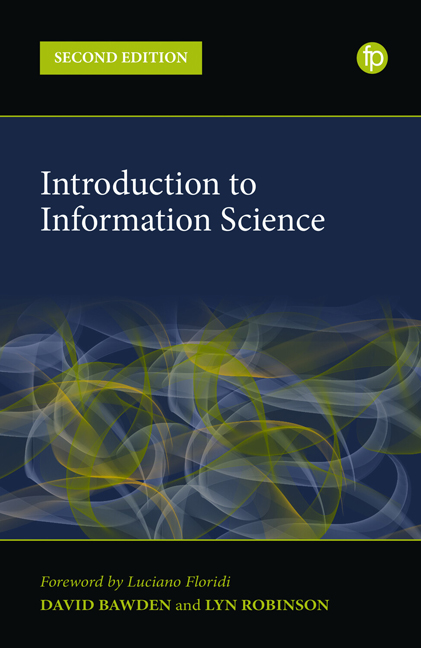Book contents
- Frontmatter
- Contents
- Figures
- Preface
- Foreword – Curators of Semantic Capital
- List of Acronyms
- 1 The Information Science Discipline
- 2 History of Information: the Story of Documents
- 3 Philosophies of Information
- 4 Paradigms, Turns and Theories in the Information Sciences
- 5 Information
- 6 Documents and Documentation
- 7 Domain Analysis
- 8 Information Organisation
- 9 Digital Technologies and Data Systems
- 10 Information Systems
- 11 Informetrics
- 12 Information Behaviour
- 13 Communicating Information: Changing Contexts
- 14 Information Management and Policy
- 15 Information Law and Ethics
- 16 Information Society
- 17 Digital (Onlife) Literacies
- 18 Research in the Information Sciences
- 19 The Future of the Information Sciences
- Additional Resources
- Index
16 - Information Society
Published online by Cambridge University Press: 21 April 2022
- Frontmatter
- Contents
- Figures
- Preface
- Foreword – Curators of Semantic Capital
- List of Acronyms
- 1 The Information Science Discipline
- 2 History of Information: the Story of Documents
- 3 Philosophies of Information
- 4 Paradigms, Turns and Theories in the Information Sciences
- 5 Information
- 6 Documents and Documentation
- 7 Domain Analysis
- 8 Information Organisation
- 9 Digital Technologies and Data Systems
- 10 Information Systems
- 11 Informetrics
- 12 Information Behaviour
- 13 Communicating Information: Changing Contexts
- 14 Information Management and Policy
- 15 Information Law and Ethics
- 16 Information Society
- 17 Digital (Onlife) Literacies
- 18 Research in the Information Sciences
- 19 The Future of the Information Sciences
- Additional Resources
- Index
Summary
We can see now that information is what our world runs on: the blood and the fuel, the vital principle.
James Gleick (2011, 8)We are so familiar with the talk of ‘the information society’ that we sometimes forget there is no such thing, but rather a multitude of societies, unalike from each other, some of which may qualify as information ones in different ways and degrees.
Luciano Floridi (2016, 1)Introduction
Since the later years of the 20th century it has become commonplace for commentators to declare that we are living in an ‘information society’. In this chapter we will first consider the nature of, and criteria for, an information society. We will then look at some of the frameworks and infrastructures which support it, and some of the problems and issues which it brings with it.
Understanding information society
Information society is not a recent phenomenon. As Floridi (2014a; 2016) reminds us, it would be reasonable to say that information society emerged in the Bronze Age with the introduction of written communication and records. The contributors to Rayward (2008) identify origins of our present information society in the early 20th century. However, we tend to think of the development of information society as synonymous with the widespread use of digital information systems (Gleick, 2011, chapters 14 and 15; Floridi, 2014a; Lindgren, 2017). While information use has been a feature of all historic societies, in our current situation of hyperhistory (Floridi, 2014a), our use of information and communication technologies defines our society as one rooted in the infosphere. Put simply, as Gleick points out in our opening quotation, information is what our world runs on. There are different kinds of information societies, but a mature information society is one ‘whose members assume the digital as a foregone phenomenon’ (Floridi, 2019, 183).
Considered in more detail, however, there are a number of different criteria by which we may recognise and define information society. We will consider these in outline; for detailed analysis, see Feather (2017), Webster (2014), Floridi (2016) and Beaulieu and Leonelli (2021).
- Type
- Chapter
- Information
- Introduction to Information Science , pp. 317 - 330Publisher: FacetPrint publication year: 2022



